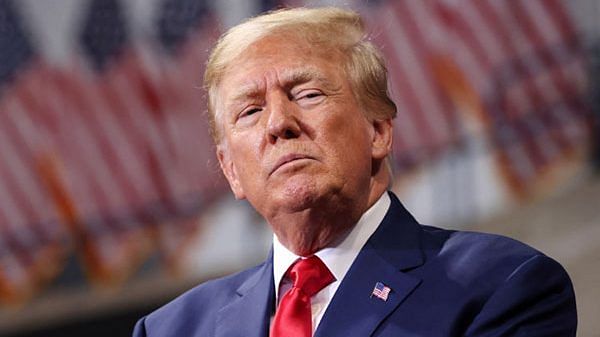H-1Battle for America is Trump’s first challenge

For Donald Trump supporters in the US, January was expected to mark a triumphant return—the crowning of the President-elect to Make America Great Again. However, the unity of his backers was broken by Indians seeking H-1B visas to fulfil their immigration dreams.
The H1B programme, which allows highly skilled professionals such as computer scientists and engineers to work in the US, has long benefitted Indians. In 2023, 72.3 per cent of all H-1B visas were issued to Indian nationals, according to data from the United States Citizenship and Immigration Services (USCIS). That year, the USCIS approved 386,340 visa petitions. This intense focus on the H-1B system is why it’s ThePrint’s Newsmaker of the Week.
The tension escalated following Trump’s re-election on 5 November 2024, with a victory over the “woke” Democrats and their open-border policies. However, by late December, Trump loyalists like Laura Loomer had publicly fallen out with X owner Elon Musk—who donated $277 million to Trump’s campaign, effectively ensuring his return to the White House—over high-skilled immigration policies.
Trump’s stance on H-1B visas reflects a shift from his earlier hardline approach. “I have always felt we must have the most competent people in our country. We need smart people. We need a lot of people coming in. We are going to have jobs like never before,” he said on New Year’s Eve.
Free and Fair Journalism Will Continue to be Important in 2025
You are crucial in ensuring that independent journalism thrives. Support us in delivering unbiased, in-depth stories that matter.
Musk initially declared he was ready to “go to war” over the issue but mellowed down days later, calling for reforms to the H-1B system.
Also read: TalkPoint: Is H1B VISA the only aspiration for Indian engineering students in the US?
Conspiracies, racism, and policy debates
The MAGA war over H-1B visas erupted on Christmas Eve when Loomer, a noted conspiracy theorist, criticised the appointment of Sriram Krishnan, a Chennai-born venture capitalist and software engineer, as Senior Policy Advisor for AI in the incoming Trump administration. She called the decision “deeply disturbing.”
“How will [we] control immigration in our country and promote America First innovation when Trump appointed this guy who wants to REMOVE all restrictions on green card caps in the United States so that foreign students (which makes up 78% of the employees in Silicon Valley) can come to the US and take jobs that should be given to American STEM students.” Loomer posted on X.
Billionaire David Sacks, former PayPal executive and incoming member of Trump’s administration, defended Krishnan’s appointment, saying the attacks on him “have become crude”. Similarly, Congressman Ro Khanna, representing Silicon Valley, emphasised that Krishnan’s story reflects American exceptionalism.
“You fools criticizing @sriramk as Indian born criticize Musk as South African born or Jensen as Taiwanese born. It is GREAT that talent around the world wants to come here, not to China, & that Sriram can rise to the highest levels. It’s called American exceptionalism,” Khanna posted on X.
In return, some MAGA supporters attacked Khanna, calling him a “phony” and accusing his family of “abusing H1B.”
Actually, they are not. My Dad came to study engineering at Michigan in the 1960s inspired by the space race and Kennedy and America. He’s still a Wolverines fan. https://t.co/3wD1g3TIyy
— Ro Khanna (@RoKhanna) December 28, 2024
The rise of Indian Americans in the US
If Indians and Indian Americans have faced visceral attacks on social media over the past week, since the H-1B debate reached a boiling point, it has a lot to do with their success as a community in the US.
Currently, nearly 10 per cent of Fortune 500 CEOs are of Indian origin, including Satya Nadella, Sundar Pichai, and Laxman Narasimhan, who led Starbucks until August 2024. The last CEO of Twitter before Musk bought the platform, Parag Agrawal, grew up in Rajasthan before moving to the US.
With close to 5 million Indian Americans living in the US—accounting for 20 per cent of the Asian American population—the community’s prominence is undeniable. According to the US Census Bureau, 66 per cent of Indian Americans are immigrants, while 34 per cent were born in the US.
The median income for Indian households in 2022 was $145,000, nearly double the national average of $77,000. This figure also surpasses the average income for all Asians in the US, which stood at $112,000.
In the 2023-2024 academic year, over 3,30,000 Indian students enrolled in US institutions, making them the largest group of foreign students in the country.
The sheer number of Indian applications for H-1B visas has clearly triggered resentment from hardline anti-immigrant factions like Loomer and Steve Bannon, who argue that this influx threatens American jobs. As Trump prepares to assume office by the end of this month, bridging the schism over H-1B visas and the role of Indian Americans will be one of his administration’s first challenges.
Views are personal.
(Edited by Prashant)
